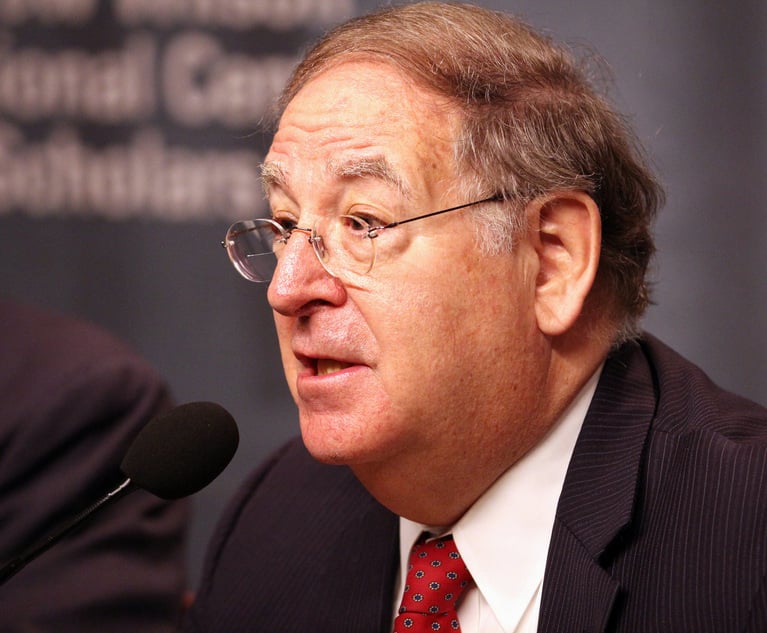Judge Busts Banking Agency for 'Excessive' Footnotes, Strikes Court Brief
Citing court rules, but perhaps also sympathizing with regular readers of legal filings, a federal judge in Washington found 48 reasons to send a regulatory agency back to the drawing board on a motion to dismiss. Judge James Boasberg ordered a motion to dismiss be "stricken" for violating a local rule that prohibits "excessive footnoting." The Office of the Comptroller of the Currency's bottom-of-the-page verbosity, Boasberg wrote, "appears to be an effort to circumvent page limitations."
July 31, 2017 at 11:16 AM
15 minute read
Citing court rules, but perhaps also sympathizing with regular readers of legal filings, a federal judge in Washington found 48 reasons to send a regulatory agency back to the drawing board on a motion to dismiss.
Squeezed into a 52-page brief by the Office of the Comptroller of the Currency last week were 48 footnotes that amounted to more than 300 lines of text. For James Boasberg, a judge on the U.S. District Court for the District of Columbia, it was just too much.
Boasberg ordered the OCC's motion to dismiss “stricken” for violating a local rule that prohibits “excessive footnoting.” The agency's bottom-of-the-page verbosity, Boasberg wrote, “appears to be an effort to circumvent page limitations.”
Now, the OCC has until Wednesday to take another stab and return with a brief containing, as Boasberg ordered, “no more than 10 footnotes containing an aggregate of no more than 50 lines.”
Neither of the two lawyers on the OCC's brief—Douglas Jordan and Peter Koch, both of whom work at the agency—commented Monday on their footnotes. An OCC spokesperson said the agency will resubmit its brief, “as requested by the court.”
The OCC filed its motion to dismiss a challenge to its decision to create a special-purpose national bank charter for financial technology—or so-called “fintech”—companies. In December, then-Comptroller of Currency Thomas Curry announced that the agency would create the new national charter for such nonbank companies to pull fintech firms into the federal regulatory system, a move that threatened to pre-empt and replace state licensing, regulation and supervision responsibilities.
The Conference of State Bank Supervisors, represented by Baker McKenzie partner Jennifer Ancona Semko in Washington, sued in April to block the move, arguing that the “OCC has gone far beyond the limited authority granted to it by Congress.”
The D.C. federal court's local rules, last updated in April, contain this provision: “All pleadings shall appear in 12-pt. font and shall be double-spaced. Footnotes, which shall not be excessive, shall also appear in 12-pt. font.” An earlier version of the rules, from April 2016, did not include the admonition against overusing footnotes.

S. Todd Rogers / The Recorder
Boasberg, on the bench since 2011, is known on the D.C. federal bench for his colorful, easily digestible prose. In a ruling in January, he referenced the TLC song “Waterfalls” in a dispute involving a U.S. Securities and Exchange Commission settlement with JPMorgan Chase & Co. McClatchy once called Boasberg “reliably readable.” The publication in another instance said Boasberg's writing “demonstrates how a simple conversational style can welcome the reader.”
Boasberg's certainly not the first federal judge to call out a party for excessive footnoting. U.S. District Judge Beth Labson Freeman for the Northern District of California in 2015 struck a filing from plaintiffs lawyers at Hagens Berman Sobol Shapiro who filed a 25-page brief loaded with 76 footnotes.
“Every page of the opposition contains at least two—and, on one page, eight—footnotes,” Freeman wrote. She ordered the lawyers to file new papers sans footnotes.
What about the U.S. Supreme Court? Justice Stephen Breyer eschews footnotes in his opinions—the only justice on the current U.S. Supreme Court to take such a position.
In a 1995 interview with the high court's in-house newsletter, The Docket Sheet, he traced his footnote-less approach to advice from Justice Arthur Goldberg, when Breyer was appointed to the U.S. Court of Appeals for the First Circuit. Goldberg, for whom Breyer had clerked, told the new judge: Don't use footnotes.
“And somewhere quite soon after becoming a judge I did stop using footnotes,” Breyer said. “Sometimes it's awkward to use none at all, but if in fact you even use one, then you cannot make the point.” He added: “Either a point is sufficiently significant to make, in which case it should be in the text, or it is not, in which case, don't make it.”
Indeed, the legal writing expert Bryan Garner has long encouraged lawyers and judges to refrain from “putting any discussion” in footnotes. On Twitter earlier this year, Garner wrote: “I detest footnotes! Isn't that coming through? Nothing needed to be read should be put there.”
In the D.C. Circuit, the problem isn't often footnotes but instead the overuse of uncommon acronyms. The court occasionally issues orders to parties either warning them to use acronyms sparingly, or even asking one party or another to refile a brief that spells out the name of the agency or the federal statute.
Marcia Coyle in Washington contributed to this report.
This content has been archived. It is available through our partners, LexisNexis® and Bloomberg Law.
To view this content, please continue to their sites.
Not a Lexis Subscriber?
Subscribe Now
Not a Bloomberg Law Subscriber?
Subscribe Now
NOT FOR REPRINT
© 2025 ALM Global, LLC, All Rights Reserved. Request academic re-use from www.copyright.com. All other uses, submit a request to [email protected]. For more information visit Asset & Logo Licensing.
You Might Like
View All
Who Are the Judges Assigned to Challenges to Trump’s Birthright Citizenship Order?

‘Undermines the Rule of Law’: Retired US Judges Condemn Trump’s Jan. 6 Pardons

'If the Job Is Better, You Get Better': Chief District Judge Discusses Overcoming Negative Perceptions

'Thoughtful Jurist': Maryland US District Senior Judge Messitte Dies After Short Illness
4 minute readTrending Stories
- 1NJ Jury Awards $4.5M After Woman Trips on Carpet
- 2Blake Lively Is Sued by Texas Crisis Specialist in Latest 'It Ends With Us' Lawsuit
- 3Pa. High Court to Decide Whether Flight in a High Crime Area Can Result in an Investigative Stop
- 4EB-5 Immigration Investor Program: a Win-Win Program, or Is It?
- 5People in the News—Feb. 6, 2025—Unruh Turner, Fox Rothschild
Who Got The Work
J. Brugh Lower of Gibbons has entered an appearance for industrial equipment supplier Devco Corporation in a pending trademark infringement lawsuit. The suit, accusing the defendant of selling knock-off Graco products, was filed Dec. 18 in New Jersey District Court by Rivkin Radler on behalf of Graco Inc. and Graco Minnesota. The case, assigned to U.S. District Judge Zahid N. Quraishi, is 3:24-cv-11294, Graco Inc. et al v. Devco Corporation.
Who Got The Work
Rebecca Maller-Stein and Kent A. Yalowitz of Arnold & Porter Kaye Scholer have entered their appearances for Hanaco Venture Capital and its executives, Lior Prosor and David Frankel, in a pending securities lawsuit. The action, filed on Dec. 24 in New York Southern District Court by Zell, Aron & Co. on behalf of Goldeneye Advisors, accuses the defendants of negligently and fraudulently managing the plaintiff's $1 million investment. The case, assigned to U.S. District Judge Vernon S. Broderick, is 1:24-cv-09918, Goldeneye Advisors, LLC v. Hanaco Venture Capital, Ltd. et al.
Who Got The Work
Attorneys from A&O Shearman has stepped in as defense counsel for Toronto-Dominion Bank and other defendants in a pending securities class action. The suit, filed Dec. 11 in New York Southern District Court by Bleichmar Fonti & Auld, accuses the defendants of concealing the bank's 'pervasive' deficiencies in regards to its compliance with the Bank Secrecy Act and the quality of its anti-money laundering controls. The case, assigned to U.S. District Judge Arun Subramanian, is 1:24-cv-09445, Gonzalez v. The Toronto-Dominion Bank et al.
Who Got The Work
Crown Castle International, a Pennsylvania company providing shared communications infrastructure, has turned to Luke D. Wolf of Gordon Rees Scully Mansukhani to fend off a pending breach-of-contract lawsuit. The court action, filed Nov. 25 in Michigan Eastern District Court by Hooper Hathaway PC on behalf of The Town Residences LLC, accuses Crown Castle of failing to transfer approximately $30,000 in utility payments from T-Mobile in breach of a roof-top lease and assignment agreement. The case, assigned to U.S. District Judge Susan K. Declercq, is 2:24-cv-13131, The Town Residences LLC v. T-Mobile US, Inc. et al.
Who Got The Work
Wilfred P. Coronato and Daniel M. Schwartz of McCarter & English have stepped in as defense counsel to Electrolux Home Products Inc. in a pending product liability lawsuit. The court action, filed Nov. 26 in New York Eastern District Court by Poulos Lopiccolo PC and Nagel Rice LLP on behalf of David Stern, alleges that the defendant's refrigerators’ drawers and shelving repeatedly break and fall apart within months after purchase. The case, assigned to U.S. District Judge Joan M. Azrack, is 2:24-cv-08204, Stern v. Electrolux Home Products, Inc.
Featured Firms
Law Offices of Gary Martin Hays & Associates, P.C.
(470) 294-1674
Law Offices of Mark E. Salomone
(857) 444-6468
Smith & Hassler
(713) 739-1250








